The Hindu Editorial (Theatre of the absurd) – Jun 30, 2022
Mohammed Zubair, co-founder of fact-checking website Alt News, is being made to pay for his role in drawing wide attention to the… For further reading, visit “The Hindu”. Below is today’s word list-2 for The Hindu Editorial (Theatre of the absurd) – Jun 30, 2022.
To read this article, click “The Hindu”.
This preview is provided here with permission.
Courtesy: The Hindu
The Hindu Editorial (Theatre of the absurd) – Jun 30, 2022:
- Theatre of the Absurd (phrase) – A type of drama that attempts to depict the absurdity (illogicality/stupidity) of human life using unreasonable, irrational, meaningless, and intentionally confusing action and dialogue. In layman’s terms, it was originally used to refer to a breach or violation of logic.
- theatre (noun) – drama, the stage, the performing arts.
- the absurd (noun) – something that is an illogical, unreasonable, ridiculous or laughable one.
- characteristic (adjective) – typical, usual, normal; distinctive, particular, specific.
- intolerance (noun) – bigotry, narrow-mindedness, dogmatism, illiberality, insularity, sensitivity, oversensitivity.
- pay (for) (verb) – suffer, suffer the consequences, be punished, atone, pay the price.
- draw attention to (phrase) – emphasize, put stress on, underscore, underline, highlight.
- vile (adjective) – nasty, unpleasant, bad, disagreeable, horrible, dreadful, offensive, unsavoury, disgusting, distasteful, loathsome, hateful, sickening.
- embarrassment (noun) – shame, humiliation, indignity, ignominy, loss of pride, loss of face.
- inherent (adjective) – deep-rooted, intrinsic, characteristic, basic, natural.
- absurdity (noun) – incongruity, stupidity, unreasonableness, irrationality, illogicality.
- charge (noun) – accusation, allegation, indictment,
- sought past tense of seek (verb) – try, aim, attempt.
- incite (verb) – instigate, provoke, induce, foment.
- enmity (noun) – hostility, bitterness, rancour, resentment.
- feeling (noun) – sympathy, emotion, empathy, consideration, humanity.
- complainant (noun) – litigator, appellant, claimant, plaintiff.
- pseudonymous (adjective) – false, fictitious, made-up, concocted, pretended, fake, bogus, counterfeit, pseudo.
- make clear (phrase) – explain, clarify, elucidate.
- establishment (noun) – government, the administration, the regime, the authorities.
- vengeance (noun) – revenge, retribution, retaliation.
- play out (phrasal verb) – happen, occur, take place, transpire, come about; portray, represent, depict, characterize, describe, present.
- regime (noun) – government; system.
- resentment (noun) – bitterness, indignation, irritation, displeasure, dissatisfaction, discontentment.
- expose (verb) – uncover, reveal, show, display, exhibit, disclose, manifest, unveil, unmask.
- claim (noun) – assertion, declaration, profession, affirmation, avowal.
- reflect (verb) – indicate, show, display, demonstrate, represent, exhibit.
- antipathy (noun) – hostility, aversion, opposition.
- counter (verb) – hit back at, answer, respond to, contradict, negate.
- majoritarian (adjective) – relating to a philosophy that states that a majority (sometimes categorized by religion, language, social class, or some other identifying factor) of the population is entitled to a certain degree of primacy (priority) in society, and has the right to make decisions that affect the society.
- bigotry (noun) – prejudice, bias, partiality, injustice.
- consistent with (adjective) – agreeing, in agreement with, in line with, in harmony, harmonious, in tune with.
- activist (adjective) – relating to a person who supports a political change or cause; (or societal change/cause).
- excesses (noun) – uncontrolled behaviour; unrestricted conduct; extreme, violent actions which are unacceptable.
- imprisonment (noun) – incarceration, confinement, custody.
- conjure up (phrasal verb) – make something appear, generate, produce, generate (unexpectedly or by magic).
- investigative agencies (noun) – India has a number of investigative agencies like The Central Bureau of Investigation (CBI), The National Investigation Agency (NIA), The Narcotics Control Bureau (NCB) and others.
- highlight (verb) – underline, underscore, emphasize.
- hate speech (noun) – abusive or disrespectful speech.
- flagrant (adjective) – blatant, glaring, obvious/evident.
- genocidal (adjective) – relating to the deliberate mass murder/killing.
- tenor (noun) – the general content/meaning.
- rant (noun) – verbal onslaught, verbal attack, tirade, tongue-lashing, vilification.
- conclave (noun) – meeting, conference, summit.
- objective (noun) – aim, intention, goal, purpose, target.
- prosecution (noun) – legal action, legal proceeding, legal case.
- alleged (adjective) – supposed, claimed, professed, purported, reported, ostensible.
- slur (noun) – insinuation, misrepresentation, defamation, insulting remark/statement.
- embark on (verb) – begin, start, undertake, commence, set about.
- spell (noun) – period, time, term.
- persecution (noun) – oppression, victimization, harassment, discrimination, punishment.
- jurisdiction (noun) – territory, region, province, district, area (to which a court of law or other institution can exercise its authority over suits, cases, appeals etc.).
- prank (noun) – joke, funny remark.
- rather than (phrase) – instead of.
- dismay (noun) – shock, surprise, distress, anxiety, concern.
- apparently (adjective) – supposedly, seemingly, allegedly, it appears/seems that.
- breath-taking (adjective) – thrilling, astonishing, spectacular, stunning.
- insinuation (noun) – (unpleasant/bad) reference, indication, implication; slur, misrepresentation, defamation, insulting remark/statement.
- deity (noun) – god, divine being.
- magistrate (noun) – the judicial officers or civil officers of a state who handle minor legal cases in a specific area like town, district etc.
- entertain (verb) – consider, give consideration to, take into consideration; agree to, approve of, support to.
- first information report (FIR) (noun) – a written document prepared by the police when they receive information about the commission of a cognizable offence.
- custody (noun) – imprisonment, detention, confinement, incarceration.
- as well as (phrase) – and also, and in addition.
- in/at times (phrase) – sometimes, occasionally, from time to time, now and again
- constitutional court (noun) – The Supreme Court of India is the supreme judicial body of India and the highest court of India under the constitution. It is the most senior constitutional court, and has the power of judicial review. The high courts that deal primarily with constitutional law are also called as the constitutional courts.
- the executive (noun) – the executive is a branch of government that enforces the law as written by the legislature and interpreted by the judiciary.
- magistracy (noun) – the office of a magistrate.
- follow suit (phrase) – emulate, copy, follow, take (another’s actions as an example).
- Section 153A of the IPC (noun) – it deals with speech that seeks to promote enmity between different communities.
- Section 295A of the IPC (noun) – it criminalises speech that outrages religious feelings, are also vestiges of colonialism.
- Indian Penal Code (IPC) (noun) – The Indian Penal Code (IPC) is the official criminal code of India. It is a comprehensive code intended to cover all substantive aspects of criminal law. The draft was passed into law on 6 October 1860. The Code came into operation on 1 January 1862. The Indian Penal Code of 1860, sub-divided into 23 chapters, comprises 511 sections. IPC deals with crimes and punishments.
- attract (verb) – draw, evoke, give rise to, bring/call forth.
- comprehension (noun) – understanding, apprehension, knowledge, interpretation, perception, discernment.
- beyond comprehension (phrase) – impossible to imagine; cannot understand; mystifying.
- lay down (phrasal verb) – state clearly, define, prescribe, specify, stipulate.
- malicious (adjective) – evil-intentioned, spiteful, illnatured, vengeful, vindictive, hostile, venomous, poisonous.
- unwittingly (adverb) – unintentionally, unconsciously, inadvertently, accidentally, without awareness, without knowledge.
- malice (noun) – ill will, hostility, hatred, hatefulness, bitterness, venom, evil intentions.
- offence (noun) – crime, illegal act, wrongdoing, violation of the law, act of misconduct, misdeed.
- condemnation (noun) – censure, criticism, castigation, stricture.
- protective (adjective) – caring, mindful, careful, wary, watchful, vigilant.
- free speech (noun) – the right to express one’s opinions publicly (without any restraint).
- odium (noun) – disgrace, shame, discredit, dishonour, disrepute, stigma, loss of face, humiliation; hatred, hate, aversion, antipathy, animosity, enmity, hostility.
- hound (verb) – harass, persecute, bother, trouble, annoy, badger, torment, bully.
- the hounding (noun) – harassment, persecution, annoyance, torment, bullying.
- crackdown (noun) – clampdown, getting tough/severe measures, suppression.
- invite (verb) – cause, induce, call forth, draw, attract.
- perpetuate (verb) -cause to continue something indefinitely, particularly a bad situation, an attitude/idea/belief, etc.; keep going, keep in existence, extend/prolong.
- travesty (noun) – misrepresentation, distortion/perversion, poor imitation.
- drop (verb) – discontinue, end, stop, cease, terminate, abandon, forgo, relinquish.
- spiteful (adjective) – malicious, hateful, ill-natured, venomous, poisonous, hostile, evil-intentioned, vindictive, vengeful, vicious.
Note:
1. Click each one of the words above for their definition, more synonyms, pronunciation, example sentences, phrases, derivatives, origin and etc from http://www.oxforddictionaries.com/.
2. Definitions (elementary level) & Synonyms provided for the words above are my personal work and not that of Oxford University Press. Tentative definitions/meanings are provided for study purpose only and they may vary in a different context.
3. This word list is for personal use only. Reproduction in any format and/or Commercial use of it is/are strictly prohibited.
The Hindu Editorial (Theatre of the absurd) – Jun 30 2022:
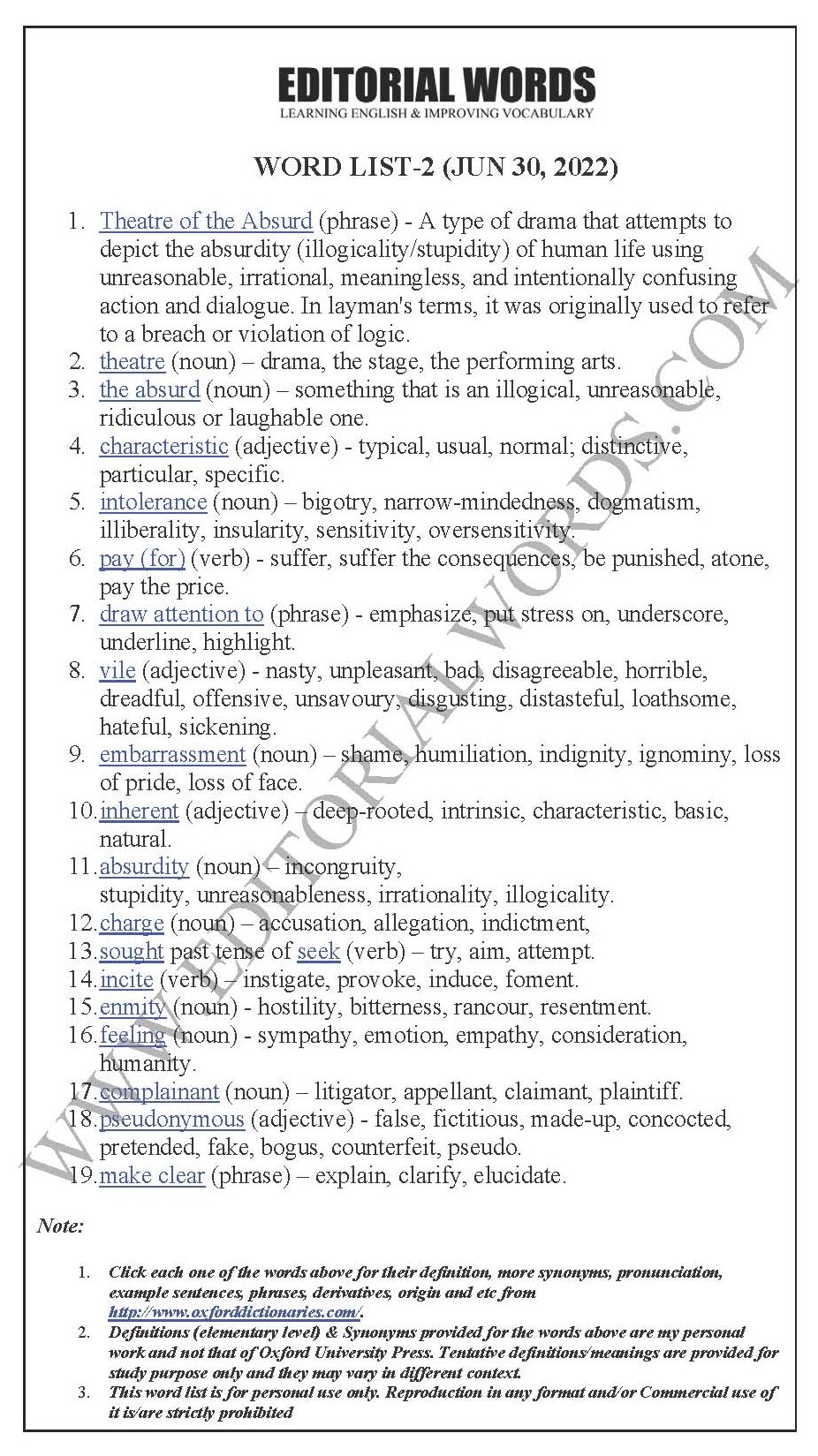
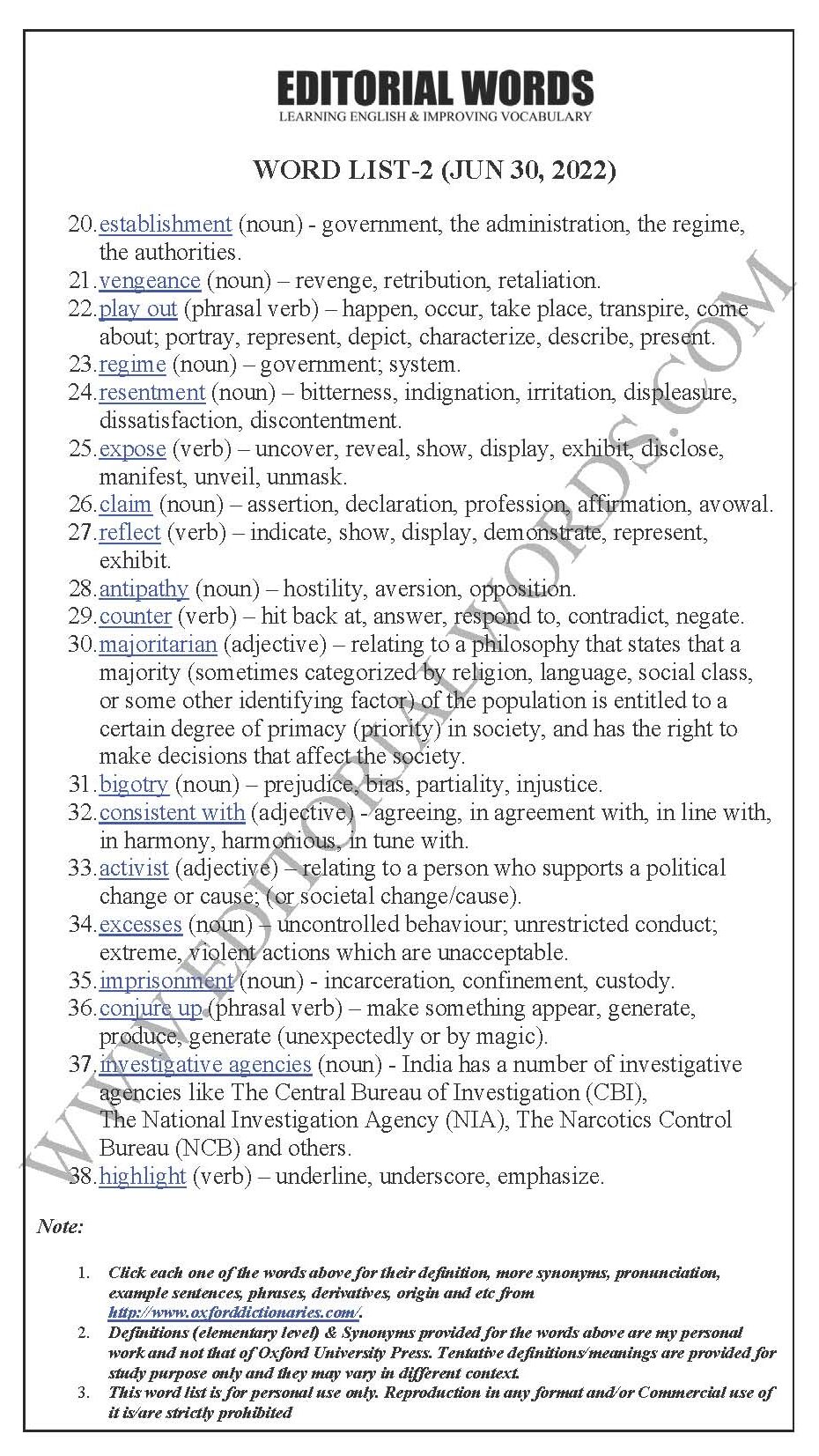
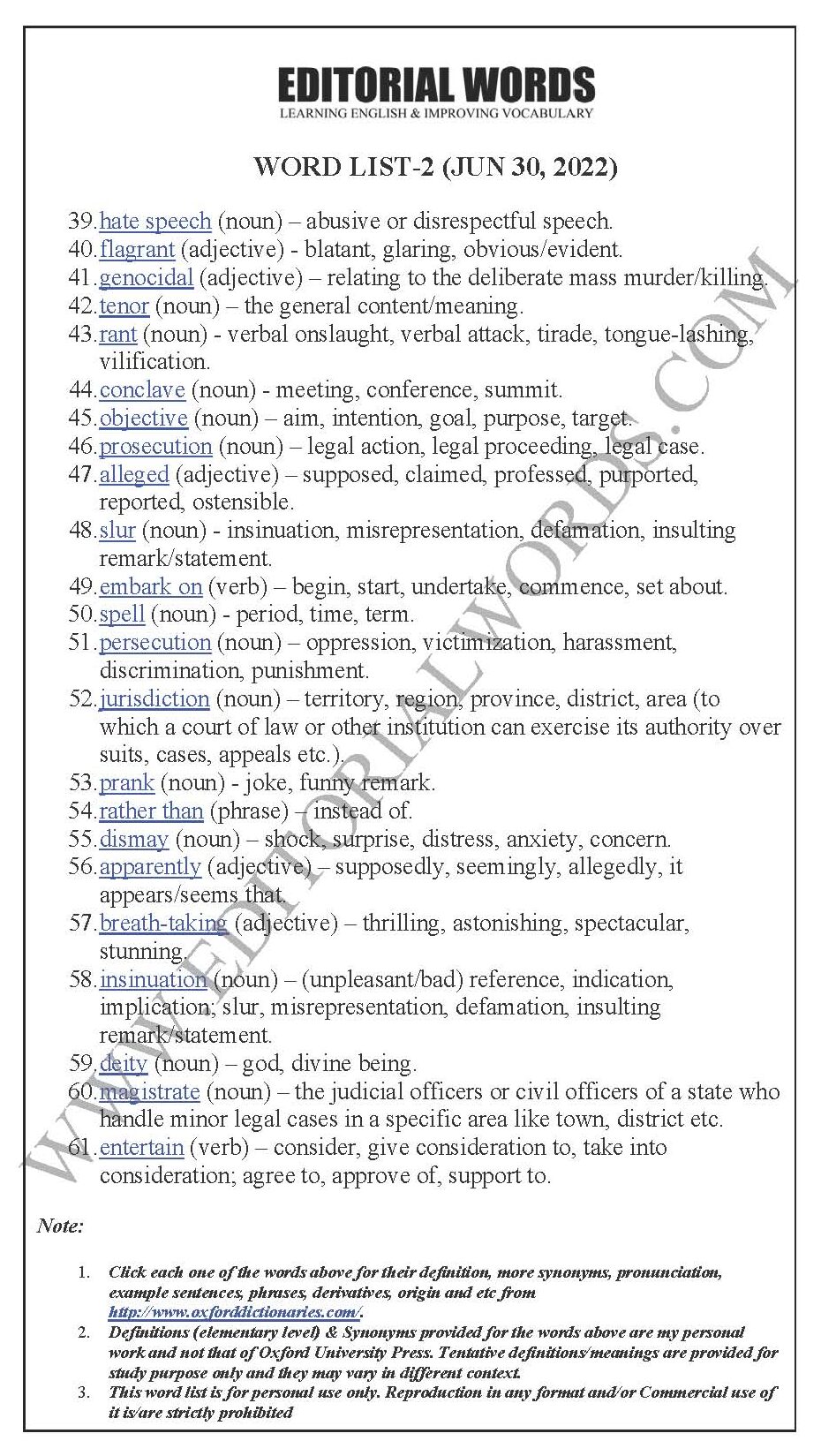
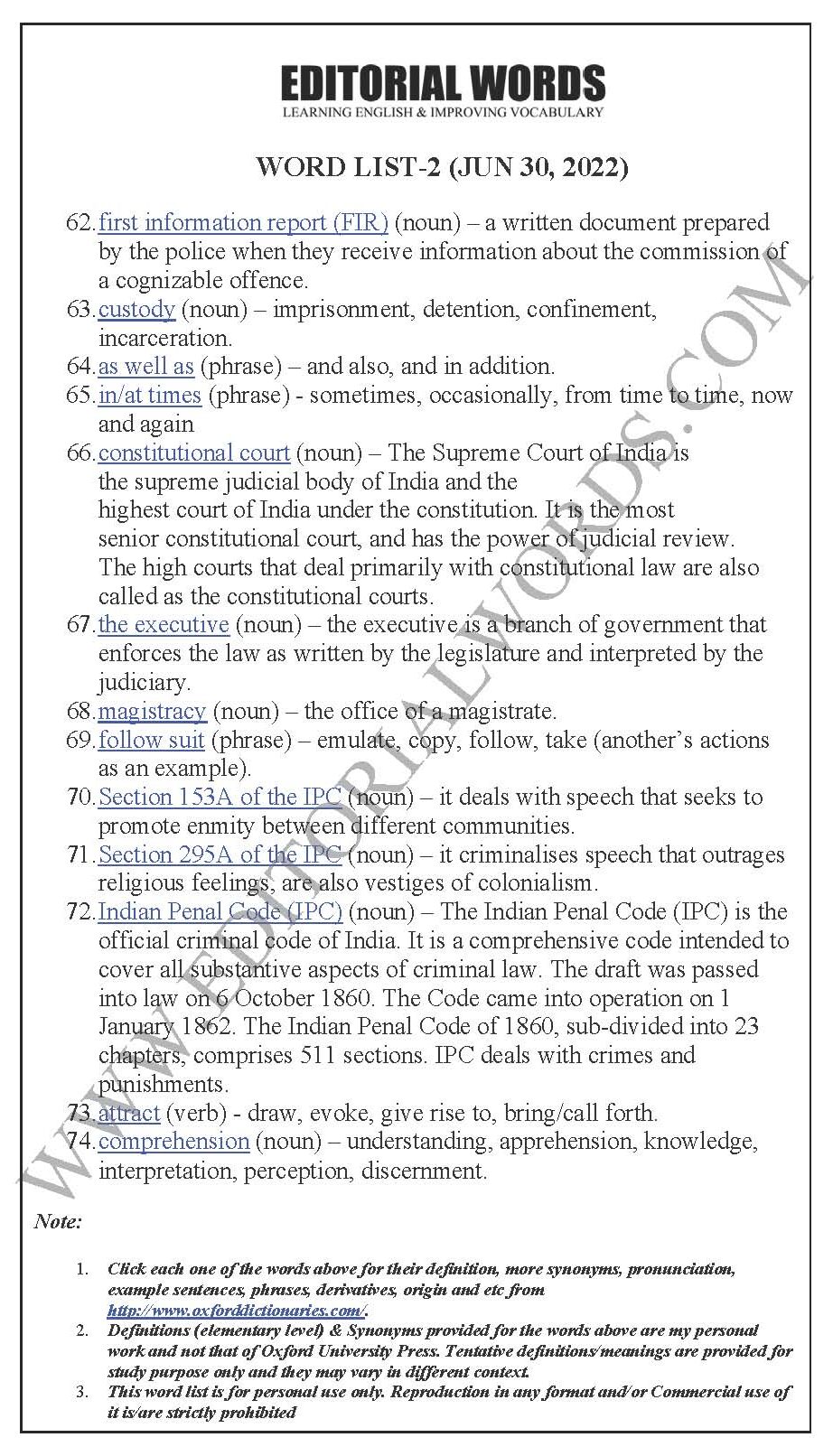
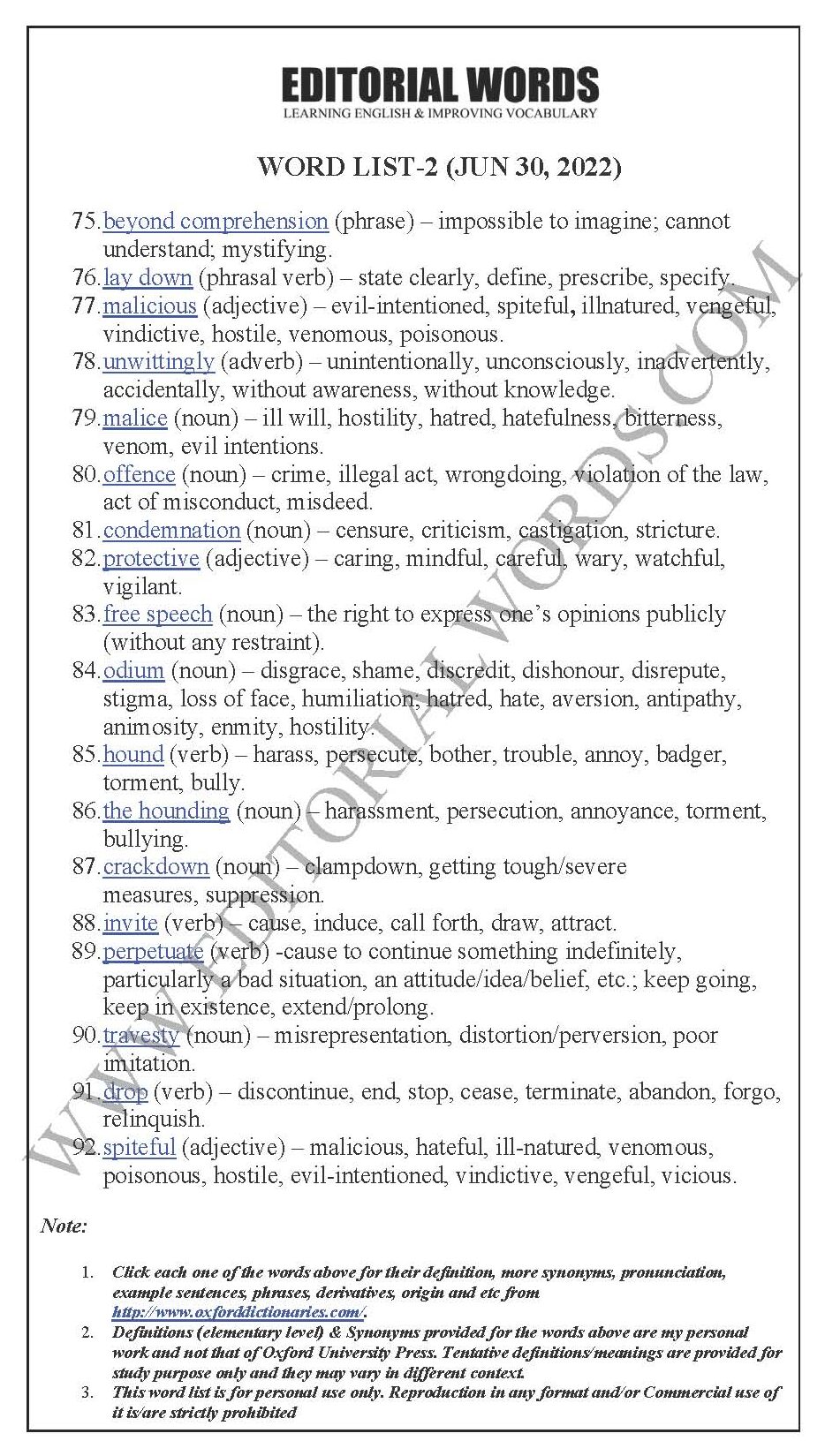
“Phrasal Verbs” We Learnt Last Week
“Idioms & Phrases” We Learnt Last Week
“Important Definitions” We Learnt Last Week
Recent Word Lists For The Hindu Editorial Articles

Be the first to comment